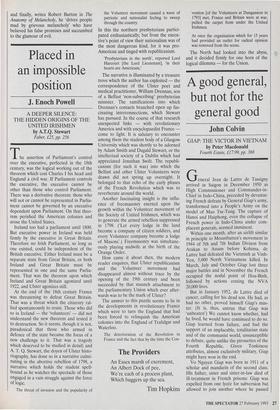Placed in an impossible position
J. Enoch Powell
A DEEPER SILENCE: THE HIDDEN ORIGINS OF THE UNITED IRISHMEN by A.T.Q. Stewart Faber, £25, pp. 256 The assertion of Parliament's control over the executive, perfected in the 18th century, was the logical working out of the theorem which cost Charles I his head and England a civil war. If Parliament controls the executive, the executive cannot be other than those who control Parliament. There was a derivative theorem: those who will not or cannot be represented in Parlia- ment cannot be governed by an executive dependent upon Parliament. On that theo- rem perished the American colonies and arose the United States.
Ireland too had a parliament until 1800. But executive power in Ireland was held firmly by the executive in Great Britain. Therefore no Irish Parliament, so long as one existed, could be independent of the British executive. Either Ireland must be a separate state from Great Britain, or both Ireland and Great Britain must be represented in one and the same Parlia- ment. That was the theorem upon which Ireland and Great Britain agonized until 1922, and Ulster agonizes still.
At the end of the 18th century France was threatening to defeat Great Britain. That was a threat which the citizenry ral- lied spontaneously to resist. Those who did so in Ireland — the 'volunteers' — did not understand the new theorem and tested it to destruction. So it seems, though it is not, paradoxical that those who armed in defence of the state became the focus of a new challenge to it. That was a tragedy which deserved to be studied in detail; and A. T. Q. Stewart, the doyen of Ulster histo- riography, has done so in a narrative culmi- nating in the abortive rebellion of 1798, a narrative which holds the student spell- bound as he watches the spectacle of those engaged in a vain struggle against the force of logic.
The threat of invasion and the popularity of the Volunteer movement caused a wave of patriotic and nationalist feeling to sweep through the country.
In this the northern presbyterians partici- pated enthusiastically; but from the execu- tive's point of view their nationalism was of the most dangerous kind, for it was pro- American and tinged with republicanism.
`Presbyterians in the north', reported Lord Harcourt [the Lord Lieutenant], 'in their hearts are Americans.'
The narrative is illuminated by a treasure trove which the author has exploited — the correspondence of the Ulster poet and medical practitioner, William Drennan, son of a Belfast 'non-subscribing' presbyterian minister. The ramifications into which Drennan's contacts branched open up fas- cinating interconnections, which Stewart has pursued. In the course of that research unexpected links — with revolutionary America and with encyclopaedist France come to light. It is salutary to encounter among them the student body of a Glasgow University which was shortly to be adorned by Adam Smith and Dugald Stewart, or the intellectual society of a Dublin which had appreciated Jonathan Swift. The republi- canism (for such it was) into which the Belfast and other Ulster Volunteers were drawn did not spring up overnight. It belonged to that echo of the early phases of the French Revolution which was to reverberate around the world.
Another fascinating insight is the influ- ence of freemasonry exerted upon the growth within the Volunteer movement of the Society of United Irishmen, which was to generate the armed rebellion suppressed in 1798. Met every lodge in the land become a company of citizen soldiers, and every Volunteer company become a lodge of Masons'.) Freemasonry was simultane- ously playing midwife at the birth of the Orange Order.
How came it about then, the modern reader enquires, that Ulster republicanism and the Volunteer movement had disappeared almost without trace by the opening of the 19th century and been succeeded by that staunch attachment to the parliamentary Union which ever after- wards was to be the mark of Ulster?
The answer to this puzzle seems to lie in the developments in revolutionary France which were to turn the England that had been forced to relinquish the American colonies into the England of Trafalgar and Waterloo.
The deterioration of the Revolution in France and the fact that by the time the Con- vention [of the Volunteers at Dungannon in 1793] met, France and Britain were at war, pulled the carpet from under the United Irishmen.
At once the organisation which for 15 years had provided an outlet for radical opinion was removed from the scene.
The North had looked into the abyss, and it decided firmly for one horn of the logical dilemma — for the Union.


















































 Previous page
Previous page